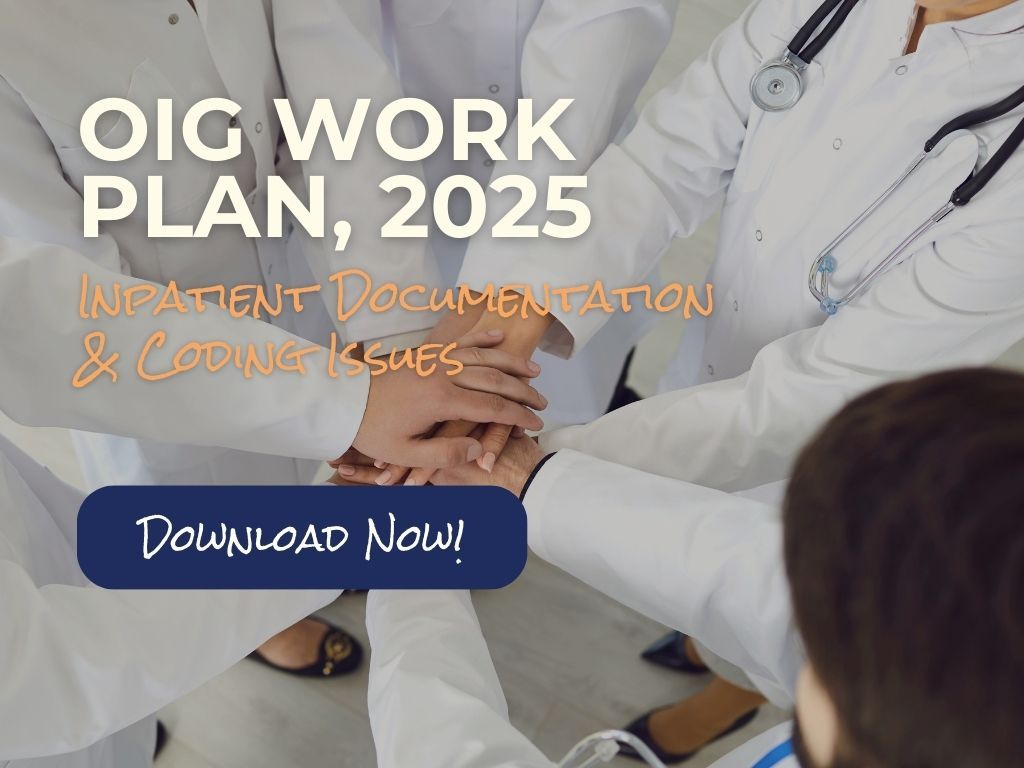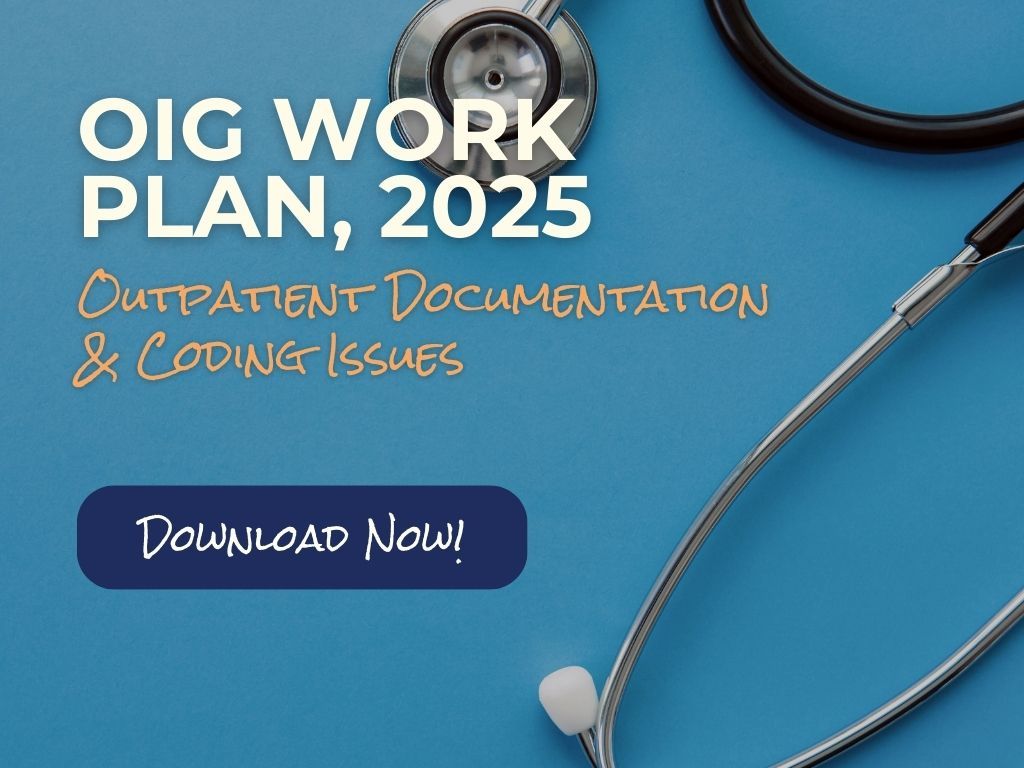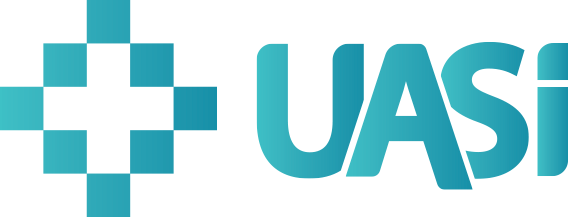By Brandon Losacker
•
March 4, 2025
Presented below is an analysis of new and ongoing initiatives under the Office of the Inspector General (OIG) Work Plan [1] and Centers for Medicare & Medicaid Services (CMS) approved Recovery Audit Contractor (RAC) reviews [2] as of January 2025. The focus is on inpatient initiatives related to HIM coding and documentation requirements and is not intended to review every active work plan item. For each relevant initiative, a summary of the compliance concern, the month and year of the initiative and related coding and documentation requirements is included. More importantly, for each inpatient initiative presented, UASI has included specific suggested compliance activities to assist our clients with their ongoing compliance efforts. The Office of the Inspector General’s (OIG) work plan process is dynamic and changes are made throughout the year. This allows the OIG to meet priorities and react to emerging issues. The OIG work plan website is updated monthly. While there are many topics on the work plan, the majority do not apply to coding and documentation. The information below includes an analysis of the following active inpatient topics: · Medicaid Inpatient Hospital Claims with Severe Malnutrition (OIG) · CMS Oversight of the Two-Midnight Rule for Inpatient Admissions (OIG) · Inpatient Hospital MS - DRG Coding Validation (RAC) Medicaid Inpatient Hospital Claims with Severe Malnutrition, Revised 2024 Severe Malnutrition remains an active item on the OIG workplan. Malnutrition can result from treatment of another condition, inadequate treatment or neglect, or general deterioration of a patient’s health. Hospitals are allowed to bill for treatment of malnutrition based on the severity of the condition (mild, moderate, or severe) and whether it affects patient care. Severe malnutrition is classified as a major complication or comorbidity (MCC). Adding an MCC to a claim may result in higher reimbursement as the claim is coded to a higher MS-DRG. Criteria related to severe malnutrition diagnosis and identification of severity is based on two main sets of criteria: · First, the American Society of Parenteral and Enteral Nutrition (ASPEN). o ASPEN criteria include three situations where malnutrition can occur, including: § 1) Acute illness/injury present for less than 3 months; § 2) Chronic illness present for 3 months or longer; § 3) Social and environmental circumstances limiting access or ability to self-care. o In each of these situations, ASPEN criteria has specific measurement related to energy intake, weight loss, muscle mass loss, body fat loss, edema, and reduced grip strength. · The second criteria in the Global Leadership Initiative on Malnutrition (GLIM). o The GLIM criteria include three phenotypical criteria of weight loss, low BMI, and reduced muscle mass as well as two etiological criteria of reduced food intake or absorption, and increased disease burden or inflammation. Documentation of severe malnutrition, as supported by either ASPEN and GLIM criteria, must also be supported by the treatment plan addressing the underlying etiology and continued treatment beyond the acute care setting. UASI Suggested Compliance Activities · Establish CDI and coding policies related to the use of either ASPEN or GLIM criteria in evaluating the documentation of malnutrition. · Provider education · Develop malnutrition education processes for providers with an emphasis on documentation of the appropriate malnutrition criteria. · Provide ongoing and updated education as identified in documentation audits. · Develop an audit plan · Consider a second-level review process for evaluation of malnutrition documentation, prior to release of the claim. · Establish an audit plan for concurrent and/or retrospective audits for a malnutrition diagnosis. CMS Oversight of the Two-Midnight Rule for Inpatient Admissions, Revised 2024 Prior OIG audits identified millions of dollars in overpayments for inpatient claims with short lengths of stay. Instead of billing the stays as inpatient claims, they should have been billed as outpatient claims, which usually results in a lower payment. To reduce inpatient admission errors, CMS implemented the Two-Midnight Rule in fiscal year 2014. Under the Two-Midnight Rule, CMS generally considered it inappropriate to receive payment under the inpatient prospective payment system for stays not expected to span at least two midnights. The only procedures excluded from the rule were newly initiated mechanical ventilation and any procedures appearing on the Inpatient Only List. Revisions were made to the Two-Midnight Rule after its implementation. OIG plans to audit hospital inpatient claims after the implementation of and revisions to the Two-Midnight Rule to determine whether inpatient claims with short lengths of stay were incorrectly billed as inpatient and should have been billed as outpatient or outpatient with observation. OIG also plans to review policies and procedures for enforcing the Two-Midnight Rule at the administrative level and contractor level. While OIG previously stated that it would not audit short stays after October 1, 2013, this serves as notification that the OIG will begin auditing short stay claims again, and when appropriate, recommend overpayment collections. When a Medicare beneficiary arrives at a hospital in need of medical or surgical care, the physician or other qualified practitioner must decide whether to admit the beneficiary as an inpatient or treat him or her as an outpatient. These decisions have significant implications for hospital payment as not all care provided in a hospital setting is appropriate for inpatient services. Beginning October 1, 2013, CMS adopted the Two-Midnight rule for admissions. This rule established Medicare payment policy regarding the benchmark criteria to use when determining whether inpatient admission is reasonable and necessary. In general, the original Two-Midnight rule states: · Inpatient admissions would generally be payable if the admitting practitioner expected the patient to require a hospital stay that crossed two midnights and the medical record supported that reasonable expectation. The rule was revised in 2016 to permit greater flexibility for determining when an admission that does not meet the benchmark should nonetheless be payable as an inpatient encounter. · Medicare Part A payment is generally not appropriate for hospital stays expected to last less than two midnights. · The documentation in the medical record must support that an inpatient admission is medically necessary. The most recent update to the CMS Two-Midnight Rule occurred in April 2023, when CMS finalized the rule clarifying that Medicare Advantage (MA) plans must also adhere to the Two-Midnight Rule. UASI Suggested Compliance Activities · Collaborate with utilization review (UR) or case management (CM) for potential two- midnight rule issues · If concurrent review processes are in place, review orders to ensure correct patient placement and involve UR as needed Inpatient Hospital MS-DRG Coding Validation, February 2017 This topic remains on the UASI analysis as it is still an active RAC audit topic and there are ongoing audits related to MS-DRG Coding Validation. The background associated with this ongoing audit is noted below. The OIG analyzed paid Medicare Part A claims for inpatient hospital stays from FY 2014 through FY 2019 and identified trends in hospital billing and Medicare payments for stays at the highest MS-DRG severity level. The number of stays at the highest severity level increased almost 20 percent from FY 2014 through FY 2019, ultimately accounting for nearly half of all Medicare spending on inpatient hospital stays. The number of stays billed at each of the other severity levels decreased. At the same time, the average length of stay decreased for stays at the highest severity level, while the average length of all stays remained largely the same. Specifically, nearly a third of these stays lasted a particularly short amount of time and over half of the stays billed at the highest severity level had only one diagnosis qualifying them for payment at that level. Shorter stays are not inherently problematic, but the number of these stays raises questions about the accuracy and appropriateness of the complications billed by the hospital. Although the complications billed suggest sicker beneficiaries, the shorter lengths of stay point to beneficiaries who are less sick. Excluded from this analysis are certain stays that could be expected to be shorter, such as stays during which the beneficiary died. Furthermore, over half of the stays billed at the highest severity level in FY 2019 (54%) reached that level because of just one diagnosis. In total, nearly 2 million stays had just 1 diagnosis (i.e., 1 major complication/comorbidity) that qualified the stay for the highest severity level. The rest of the submitted diagnoses for these stays were either minor complications or not complications. As a result of this analysis, CMS continues to conduct targeted reviews of MS-DRGs and hospital stays that are vulnerable to up-coding (i.e., those that are billed at the highest severity level) and the hospitals that frequently bill for them. Specifically, CMS targets stays at the highest severity level with certain characteristics, such as those that are particularly short lengths of stay or that have only one major complication. CMS also focuses on MS-DRGs that have a high proportion of stays with these characteristics and on the hospitals that frequently bill them. CMS’s RACs currently conduct coding validation reviews that incorporate some of these targeting strategies. [7] In evaluating current audit plans, consider focusing on short stays, especially those with a single CC or MCC or a complex principal diagnosis (e.g., Sepsis, AKI, ARF). UASI also suggests targeting some of the following MS-DRGs for audit depending on your case mix and volume: · MS-DRGs 064 – 066 Intracranial Hemorrhage or Cerebral Infarction · MS-DRGs 193 – 195 Simple Pneumonia and Pleurisy · MS-DRGs 280 – 282 Acute MI Discharged Alive · MS-DRGs 291 – 293 Heart Failure and Shock · MS-DRGs 308 – 310 Cardiac Arrhythmias and Conduction Disorders · MS-DRGs 377 – 379 Gastrointestinal Hemorrhage · MS-DRGs 637 – 639 Diabetes · MS-DRGs 689 – 690 Kidney & Urinary Tract Infections · MS-DRGs 870 – 872 Septicemia or Severe Sepsis · MS-DRGs 981 – 983 Extensive OR Procedures Unrelated to Principal Diagnosis UASI Suggested Compliance Activities · Select targeted MS-DRGs · Evaluate the data for the top 20-25 MS-DRGs and review for any of the above indicators plus any additional MS-DRGs with high volume. · Review the most recent PEPPER reports for MS-DRGs that may be at risk of improper payment. [8] · Establish a prioritized list of MS-DRGs for review. If possible, review cases with short lengths of stay and one MCC/CC. · Develop an audit plan · Establish an audit plan for concurrent and/or retrospective audits. · Retrospective audits can be conducted in part or wholly by incorporating selected MS-DRGs into your audit plan. Problem MS-DRGs can then be incorporated into a concurrent review work queue, if warranted. · Concurrent coding audits should be limited in scope to address specific areas impacting quality reporting and reimbursement. Timeliness is critical as these accounts are held for additional review prior to releasing the bill. Turnaround time to release cases should be short, 24 to 48 hours, to minimize the impact to DNFB (discharged not final billed) daily/weekly goals. · Audits can be conducted either internally or externally. Internal audits should be conducted based on the availability of staff with appropriate technical expertise (in coding and clinical documentation) and proficiency in communicating feedback through written reports and educational sessions. · Determine the audit scope, considering opportunities for cross-departmental collaboration to address multiple risk factors. For example, clinical documentation improvement (CDI) staff may collaborate with coding staff to conduct an audit on sepsis DRGs, addressing both coding and clinical documentation compliance perspectives. · At a minimum inpatient audit should measure and validate the following: · Accurate identification of principal and secondary diagnosis and procedure codes in accordance with official and facility-specific coding guidelines · Accurate MS-DRG or APR-DRG assignment · Accurate POA indicator assigned for all non-exempt diagnosis codes · Accurate Discharge Disposition assignment · Develop corrective action plans, including physician and coder education, based on audit findings. End Notes: 1. OIG Work Plan: https://oig.hhs.gov/reports-and-publications/workplan/index.asp 2. CMS, Approved RAC Topics, last revised 12/01/2024, accessed on January 14, 2025. https://www.cms.gov/Research-Statistics-Data-and-Systems/Monitoring-Programs/Medicare-FFS-Compliance-Programs/Recovery-Audit-Program/Approved-RAC-Topics 3. CMS Reminds Hospitals to Use Severe Malnutrition Codes Correctly. October 17, 2023. Article Detail - JF Part A - Noridian 4. Fact Sheet: Two-Midnight Rule; Oct 30, 2015. Fact Sheet: Two-Midnight Rule | CMS











